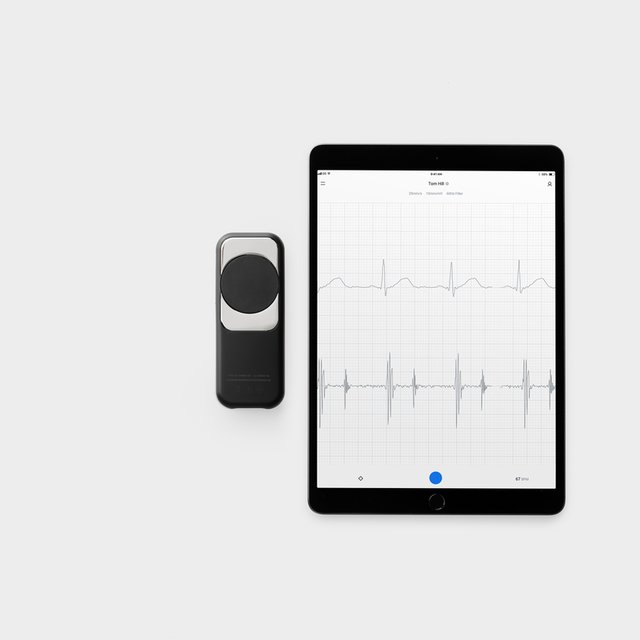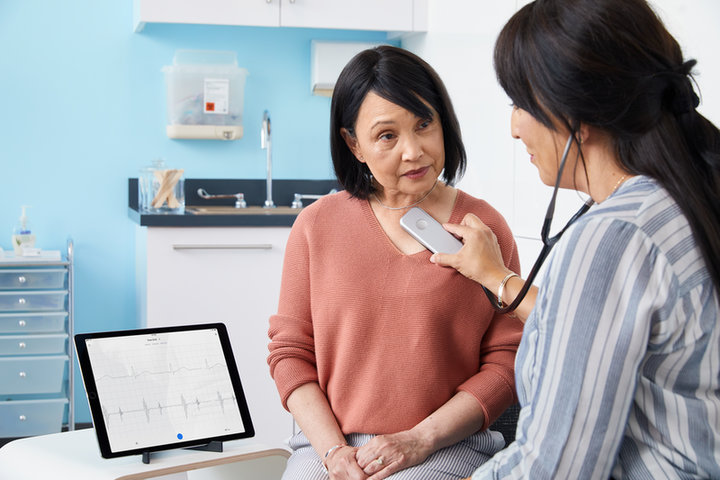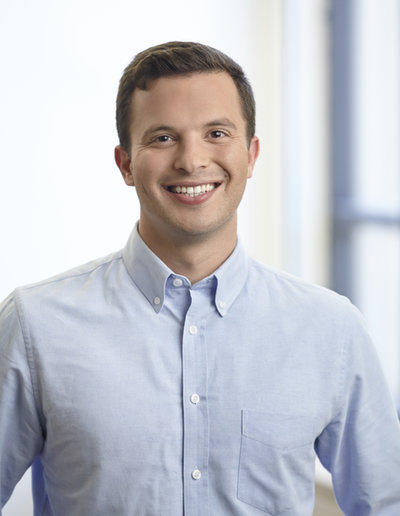
Eko
Listening to What the Heart Speaks
By Elena Borrelli

"This tool that’s worn around my neck and almost every clinician in the world is extremely inefficient.”
...said one of the doctors to Connor Landgraf, while he was doing user research, talking to cardiologists about their pain points. Baffled Landgraf was then working on his thesis for bioengineering class.
"A lightbulb went off for Connor," recounts Jason Bellet, co-founder and COO, Eko. It was no brainer that the 200-year-old stethoscope required to be re-engineered. "Here we were at California, in Silicon Valley, there’s a smartphone in everyone’s pocket, and machine learning is proving to advance every industry - there had to be a way to build a smarter stethoscope. At the time I was in the business school at UC Berkeley, Connor was studying biomedical engineering, and our third co-founder, Tyler Crouch, was a mechanical engineering student. We all came together and decided this is what we wanted to dedicate ourselves to after graduating," reminiscences Bellet.
Reinventing the 200-year-old stethoscope
Mayo Clinic Collaboration: Detecting Low Ejection Fraction
The Stethoscope is ubiquitous and still the most heavily relied upon cardiac and pulmonary screening tool, the effectiveness of which depends on the skill, experience and hearing abilities of the doctor using it. It demands a highly trained ear that can separate subtle abnormalities from normal sounds with cardiologist-level precision. Without years of cardiac training and experience with patients, it’s difficult to recognize, much less diagnose, heart and lung abnormalities. Interpreting the sounds is sometimes more art than science, doctors say.
While more objective cardiac screening tools, such as echocardiograms, are available in specialty clinics, the low cost and speed of the stethoscope exam makes it the standard for heart disease screening. “One of the biggest problems in healthcare is that general practitioners so often miss heart murmurs that if found earlier would allow patients to get treatment before problems arise,” says Landgraf, co-founder and CEO.
After a few years of toil, the trio reinvented the 200-year-old device by not only modernizing the hardware, but also by adding a layer of intelligence.
Eko has designed two products: CORE, delivering 40X sound amplification for your current stethoscope; and DUO, the first-ever stethoscope to combine crystal clear sound with ECG. Both FDA cleared devices seamlessly pair with Eko’s HIPAA-compliant software. Eko sells both directly to consumers in the medical profession and also works with health systems directly to deploy the technology across the entire health system. Since releasing its first-generation CORE in 2015, 30,000 physicians at over 4,000 hospitals have used the device to enhance their practice.
In November 2019, EKO launched the second-generation CORE product line. An evolution from Eko's first-generation CORE, the new CORE features powerful amplification and active noise cancellation that enables doctors and nurses to hear heart and lung sounds with greater clarity and screen patients for heart disease. “When heart and lung sounds are amplified in the screening of heart valve and pulmonary diseases, everything changes,” says Landgraf. "The redesigned CORE puts the ears of a trained cardiologist in the hands of any doctor or nurse.”
At the American Heart Association Scientific Sessions 2019, EKO presented results in collaboration with Mayo Clinic demonstrating the use of the DUO digital stethoscope as a heart failure screening tool. When tested on 100 patients, the DUO combined with an AI model was able to detect ejection fraction < 35 percent with an area under the curve (AUC) of 0.90, which is comparable to previously published research in Nature Medicine. These findings could help identify patients with a low ejection fraction during routine physical examinations, facilitating rapid clinical recognition of those requiring further testing. This marks the first time that a point of care device with a single lead ECG combined with an AI algorithm identified low ejection fraction in patients.
The algorithm analyzes 15 seconds of ECG data collected from the Eko DUO digital stethoscope during a physical exam and helps identify reduced Left Ventricular Ejection Fraction (LVEF), a measure commonly used to diagnose patients with heart failure. A low ejection fraction means that the heart pump is weak, and may be associated with heart failure. The study leveraged Mayo Clinic’s vast cardiovascular database and its expertise in medical AI and heart disease screening, and combined with Eko’s cardiac monitoring platform. Eko will continue to collaborate with the Mayo Clinic to test the low ejection fraction screening algorithm, and intends to eventually submit for regulatory clearance.
In December, FDA granted ‘Breakthrough’ Designation to Eko’s ECG-based Low Ejection Fraction Screening Algorithm. “We look forward to working with the FDA to bring this algorithm to patients and to give clinicians a new tool to screen for low ejection fraction,” says Landgraf. "“This technology gives physicians a tool to detect heart disease earlier, and before it develops into a more serious illness. In effect, by imbedding the technology in a commonly used clinical tool – the stethoscope – all caregivers carry some of the diagnostic prowess of an expert cardiologist with them.” said Dr. Paul Friedman, chair of the Department of Cardiovascular Medicine, Mayo Clinic in a press note.
Eko has also established partnerships with medical device and pharmaceutical companies to improve its combination of technology and traditional treatment for precision cardiac care. "Our technology also enhances clinical trials by providing additional layers of information and ongoing analysis, which enables researchers to make better judgements, recommendations, or adjustments to their research," explains Bellet. Eko is working with Sutter Health on advancing telemedicine, providing them with the tools to offer better cardiac care to patients in rural Northern California. "We are able to improve clinical trials by providing ongoing cardiac data for patients. The implications for our technology platform are far reaching and we are very inspired for what’s to come," notes Bellet
if you can put some of the power of the best cardiologists in the hands of every provider, that raises the bar of the healthcare system as a whole. Our mission at Eko continues to be to enable all healthcare professionals to provide the highest level of cardiac care through non-invasive, reliable products.
(Left to Right): Tyler Crouch, Connor Landgraf and Jason Bellet



Jason Bellet, Co-founder & COO, Eko
Our platform is an example of this by equipping providers with AI-powered digital stethoscopes and ECGs to assist them in the detection and monitoring of patients with cardiovascular disease. But, if you can put some of the power of the best cardiologists in the hands of every provider, that raises the bar of the healthcare system as a whole.
In Cardiology, we at Eko are applying machine learning, it can lead to earlier, and more accurate diagnosis of a variety of heart conditions, which when caught early, can be the difference between life and death. As statistics from the American Heart Association continue to show, nearly half of all U.S. adults have some form of heart disease, making advancements in detection and diagnosis more urgent than ever.
MISSION FORWARD: Paradigm Changing Medical Technology
Access to care is broken in numerous places, from those who don’t have insurance or a primary care provider, to the millions of Americans that live in rural areas with little to no access to specialists. "As a country we have a lot of doctors, but they are more commonly found in urban areas. Even then the system is so backlogged, you could live three blocks from a doctor and wait three months to be seen," explains Bellet. "Essentially, patients aren’t getting the care that they need in a timely fashion, often go undiagnosed with diseases that they could be treated for earlier and with better outcomes, and are subject to exorbitant healthcare costs. While there are thousands of possible fixes for these gaps in our healthcare system, the application of AI seems most promising to help providers at the front lines of care identify and treat disease more effectively."
Eko's platform is equipping providers with AI-powered digital stethoscopes and ECGs to assist them in the detection and monitoring of patients with cardiovascular disease. "Unfortunately, not every patient can get in to see the best cardiologists. But, if you can put some of the power of the best cardiologists in the hands of every provider, that raises the bar of the healthcare system as a whole. Our mission at Eko continues to be to enable all healthcare professionals to provide the highest level of cardiac care through non-invasive, reliable products," says Bellet.